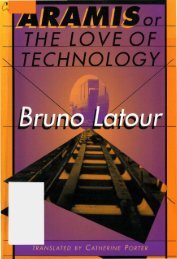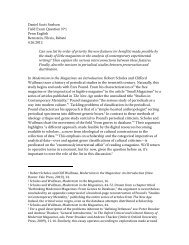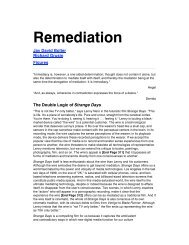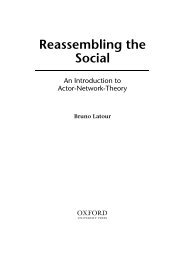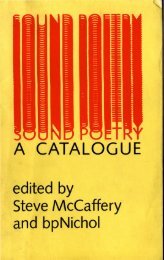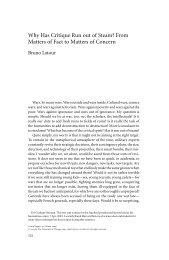The Exploit: A Theory of Networks - asounder
The Exploit: A Theory of Networks - asounder
The Exploit: A Theory of Networks - asounder
Create successful ePaper yourself
Turn your PDF publications into a flip-book with our unique Google optimized e-Paper software.
Edges 127<br />
player online games, and so on). <strong>The</strong> body becomes a medium <strong>of</strong><br />
perpetual locatability, a roving panoply <strong>of</strong> tissues, organs, and cells<br />
orbited by personal network devices.<br />
Divine Metabolism<br />
Despite, or because <strong>of</strong>, the popular notion <strong>of</strong> information as immaterial,<br />
information constantly relates to life - forms. Life - forms are not<br />
merely biological but envelop social, cultural, and political forms as<br />
well. Life - forms are the nondistinction between these. Life - forms<br />
posit the polyvalent aspect <strong>of</strong> life, all the while positing something,<br />
however inessential, called “life.” <strong>The</strong> foundation <strong>of</strong> no foundation.<br />
Life has many aspects (social, cultural, economic, genetic), and not<br />
all <strong>of</strong> those aspects have an equal claim on life—that is the attitude<br />
<strong>of</strong> the life - form.<br />
But life - forms are also the opposite: the production <strong>of</strong> a notion <strong>of</strong><br />
“life itself,” a notion <strong>of</strong> life - forms that is unmediated, fully present,<br />
and physical. This notion <strong>of</strong> the “thing itself ” acts as the foundation<br />
<strong>of</strong> life - forms, the point beyond which “life itself ” cannot be more immediate.<br />
Paradoxically, this is precisely the point at which the morethan<br />
- biological must enter the frame. Life - forms are similar to what<br />
Marx called the “inorganic body”: “Nature is man’s inorganic body—<br />
nature, that is, ins<strong>of</strong>ar as it is not itself the human body. Man lives on<br />
nature—means that nature is his body, with which he must remain<br />
in continuous intercourse if he is not to die.” 30 But despite his acute<br />
analyses, Marx is ambiguous over whether the inorganic body is something<br />
other than non - or preindustrial society. Even if we take the<br />
inorganic body broadly as “environment,” we are still left with the con -<br />
tradictory separation between individual and environment.<br />
Nevertheless, this is the nascent biopolitical aspect that Marx left<br />
unexplored—the relation between metabolism and capitalism, between<br />
what he called “social metabolism” and political economy. We<br />
leave it to Nietzsche to respond: “<strong>The</strong> human body, in which the<br />
most distant and most recent past <strong>of</strong> all organic development again<br />
becomes living and corporeal, through which and over and beyond<br />
which a tremendous inaudible stream seems to flow: the body is a



